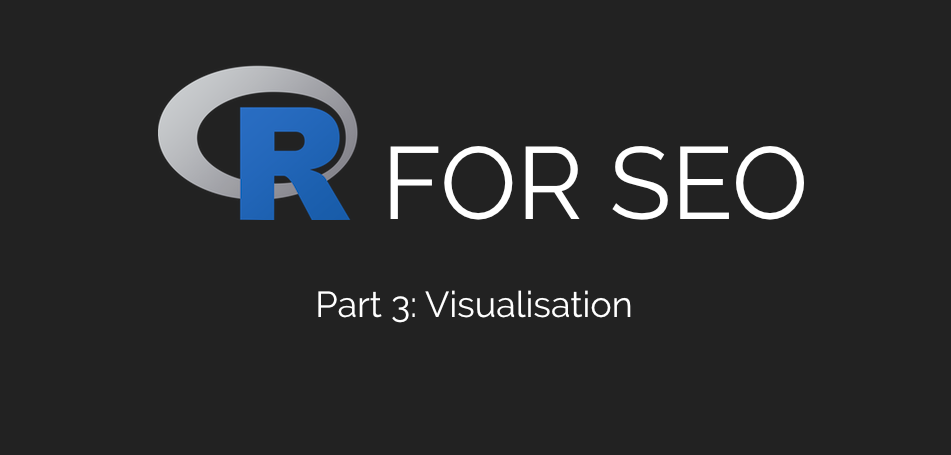Meta Tag Lengths – A Guide
Hi again. I hope you’re liking the new look and slightly more regular update schedule for the site. Rather than do another post about backlinks, social media or productivity, I thought I’d go back to basics a bit today and write a guide to meta tag lengths covering titles and descriptions across the major search engines and a couple that you might not have used before. It’s quite a long read, but there’s a nice TL/DR section at the bottom if you haven’t got the time to go through it all right now.
What Are Meta Tags?
If we’re going back to basics, we might as well go right back to basics. Meta tags are pieces of information that are used to provide a brief rundown of the information that’s on a webpage and they’re also usually the piece of content that shows up on search engine results pages. Well, that is unless Google decides that a piece of your content is more relevant to the keyword you used, but that’s another post entirely. This post, in fact.
The meta title is the title of the page. It’s usually the link to your site in search engines and some people consider it to be about 60% of your on-page SEO. Personally, I’d put that figure a bit lower, but there’s no denying that it is an important element to get right, both for your rankings and your click-through rates.
Your meta description is the piece of information you would use to describe the page, it’s as simple as that. It can usually be found below the title in search engine results and although it’s influence on search engine rankings is considered to be minimal, it is the perfect place to put a nice call to action and encourage your users to click. Remember kids, rankings are only half the battle.
Today, I’m going to cover the character lengths that will be displayed in SERPs from Google, Bing, Yahoo, Yandex, Duckduckgo and Blekko for your meta titles and descriptions. Although I still use the keywords tag, it’s so ridiculously depreciated that I’m not going to bother covering it today. With that out the way, let’s get to it:
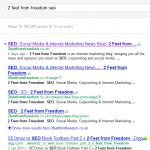
The title tag in question is exactly 70 characters and the description is running at 153, but as you can see, both are truncated in Google’s results and the title issue is quite a recent change. The description being pushed back by a date seems to be a common issue with WordPress and with the whole Query Deserves Freshness update , I don’t see that going away anytime soon, no matter how annoying it is.
From looking at this screenshot and counting the point of truncation, Google is displaying 65 characters in a title at the moment and 155 characters for the description still holds true. Obviously, that’s including spaces. With Google being the dominant search engine, you should probably optimise your meta tags for its display lengths, but that’s not to say you shouldn’t be aware of how other search engines display your titles and descriptions. Looks like it’s time to give my homepage title a rewrite.
Bing
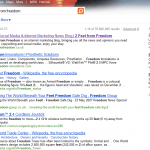
As you can see in the screenshot, Bing quite happily displays up to 70 characters in the meta title and other tests suggest you might be able to get away with two more in there, but only if they’re part of the last word in the tag. For the meta description, it seems like it gives you a bit more room to play than Google does and I’ve seen some results displaying up to 175 characters. Again though, it seems to depend on the result – you’re never going to have a problem with a 155 character meta description in Bing.
Yahoo!
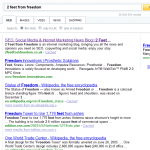
Anyway, as you can see, Yahoo truncates my 70 character title quite significantly and generally seems to display about 60 characters in the title tag. Again, like with Bing, it might give you a couple of characters grace if they’re part of the last word, but in the unlikely event that you’re optimising for Yahoo, I’d say stick to a maximum of 60 characters for your title.
Yahoo seems to show more characters in its descriptions than Google does and it looks like 160 is the cutoff.
Yandex
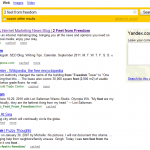
Yandex seems to display up to 75 characters in meta titles, which gives you plenty of space to work, and descriptions are currently around 185 characters. Again, this will probably have changed by the time I post this due to the way the search engine works, but if you’re planning on taking your site into the Russian market, this might help.
Blekko
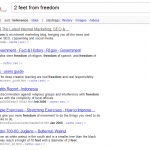
What is apparent from the search in the screenshot, however, is that Blekko’s index is updated very rarely. That meta title and description hasn’t been used on this site for ages! It also seems to only display up to 55 characters for the title tag, but covers up to 180 characters on the description on some searches. Blekko has some good characteristics and it would be nice to see them succeed, but they’re going to struggle in the market if they don’t update their index more frequently.
Duckduckgo

Results tend to be pretty good, in my opinion and my tests on it showed title attributes of as low as 60 characters and as high as 67. I’d probably recommend going for a title tag of about 65 characters if you’re optimising for Duckduckgo. Descriptions, I’ve seen as many as 287 characters show up in snippets, so I wouldn’t worry too much about keeping it short and punchy. Just use the one you’ve used for Google and hope for the best.
TL/DR – The Meta Tag Lengths For Different Search Engines
I get it, I really do – I’ve blathered on. You’re only interested in a quick answer as to how many characters you can get away with in each search engine and here we are at almost 1500 words. If you just want a quick reference guide, you’ll find it below.
| Search Engine | Characters In Title (Including Spaces) | Characters In Description (Including Spaces) |
| 65 | 155 | |
| Bing | 70 | 175 |
| Yahoo! | 60 | 160 |
| Yandex | 75 | 185 |
| Blekko | 55 | 180 |
| Duckduckgo | 65 | 287 |
I hope you’ve enjoyed today’s post as much as I enjoyed putting it together. Leave me a comment and let me know, especially if any of them have gone and changed anything over the last couple of days. Thanks for reading.
